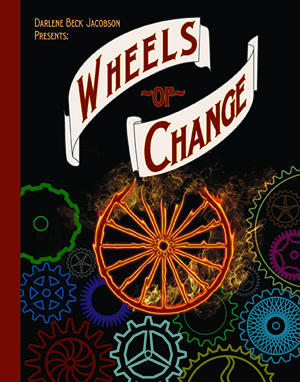"Middleview" Interview with Debut Author Darlene Beck Jacobson
Posted by Tamera Wissinger
Today, our own Smack Dab in the Middle Blogger, Darlene Beck
Jacobson is joining the blog for
a guest “middleview” interview. Darlene’s debut middle grade novel, WHEELS OF
CHANGE, released with Creston Books on 09/22/2014 to excellent reviews! Congratulations, Darlene! I’m
happy that Darlene has included Smack Dab Blog in her blog tour.
Here is a bit about Darlene:
Darlene Beck Jacobson has loved writing since she was a
girl. Although she never wrote to a
president, she sent many letters to pop stars of the day asking for photos and
autographs. She loves bringing the past
to life in stories such as WHEELS OF CHANGE, her debut novel.
Darlene’s
blog features recipes, activities, crafts and interviews with children’s book
authors and illustrators. She still loves writing and getting letters.
Here’s a description of WHEELS
OF CHANGE:
Racial
intolerance, social change, sweeping progress. It is a turbulent time growing
up in 1908. For twelve year old EMILY SOPER, life in Papa’s carriage barn is
magic. Emily is more at home hearing the symphony of the blacksmith’s hammer,
than trying to conform to the proper expectations of females. Many prominent
people own Papa’s carriages. He receives an order to make one for President
Theodore Roosevelt. Papa’s livelihood becomes threatened by racist neighbors,
and horsepower of a different sort.
Emily is determined to save Papa’s business even if she has to go all
the way to the President.
Here is the WHEELS OF CHANGE book trailer:
Now it’s time to hear from our guest:
Smack Dab Middleview with WHEELS OF CHANGE author Darlene Beck
Jacobson
1. In a nutshell, what does your main character, EMILY SOPER want?
Emily’s Papa owns a carriage
business. Emily wants to spend her time in the carriage barn, helping Papa and
hoping one day to become a blacksmith, like Papa’s beloved employee Henry. She
adores this life and wants everything to stay just as it is.
2. What is in her way?
The proper expectations and roles
for females in 1908 is one thing standing in her way. The other is the sweeping
changes – personal, social, and technological – that threaten their safe and
comfortable way of life.
3. Did you know right away that this was your story, or
did you discover it as you wrote? How did the story evolve?
The
story sprang from two family facts I discovered while researching my family
tree. One was that my paternal grandmother’s father was a carriage maker in
Washington DC at the turn of the Twentieth Century. The other was that grandma
received an invitation to a reception held at the White House by Theodore
Roosevelt. She attended that reception and met TR. Putting those two together became my “what
if”. Once I had the basic story line, I added social and cultural aspects to
broaden the story. Except for the two facts mentioned above, the rest of the
story is fiction. I like to think of it as a “reimagining” of what my grandma
could have been like.
4. Was WHEELS OF CHANGE always for middle grade readers or not? If so,
why did you choose middle grade? If not, what had to change for it to be
considered a middle grade novel?
I GET ASKED THIS QUESTION A LOT.
It’s funny because I originally thought it would make a good picture book and
had a first read by an editor in that format. Through her wise critique, she
encouraged me to expand the plot and make it an MG since that was the voice that
resonated from the pages. I am eternally grateful for her encouragement.
5. What is the best part of writing for middle grade readers?
They have active imaginations and
still love a good story. They aren’t ashamed to read their favorite passages
from books out loud, and talk about characters as if they were friends. You
don’t have to explain everything to middle graders – kids this age are great at
figuring things out for themselves. It’s a great age group.
6. Is there one question you wish you could answer about writing, your
book, or the author's life, but have never been asked? Here's your chance to Q
&A yourself.
I guess it would be what I found
most enjoyable about life in 1908. It may seem difficult in some respects –
lack of electricity, no hot running water or indoor plumbing, a good deal of
time spent on labor intensive activities. But on the plus side there was a
definite sense of community and being close to neighbors. You had to rely on
each other to get through tough times. Work – for everyone – stopped on Sunday,
so men could spend time with their families doing things together.
You also had to learn skills such
as woodworking, sewing, cooking, growing vegetables, canning foods, etc. to
survive. Most people knew how to do many things with some level of skill. There
was a sense of accomplishment in being self-sufficient that I think we’ve lost
in modern times. Now everyone depends on others to do the work. And so many of
us have lost the close connection with neighbors.
Thank you for joining us at Smack Dab in the Middle Blog, Darlene.
Again, congratulations on the release of WHEELS OF CHANGE!
Darlene recently visited Theresa Wallace-Pregent at www.booksalmagundi.wordpress.com and on October 17 she will be featured in “My
Writing and Reading Life Monthly Column” with Bianca Schulze at www.thechildrensbookreview.com
If you'd like to hear more from Darlene, she also wrote a wonderful article on Authenticity in Historical Fiction - it was featured at my personal blog on her release day.


What a pleasure it is to be featured here today! Thanks Tamera for the opportunity!
ReplyDeleteMy pleasure, Darlene. I hope you and your book are having a fabulous fall!
DeleteI loved this book.
ReplyDeleteI'm jealous...I haven't had a chance to read it yet. Soon, though.
DeleteWonderful to get to know Darlene better! Great interview!
ReplyDelete